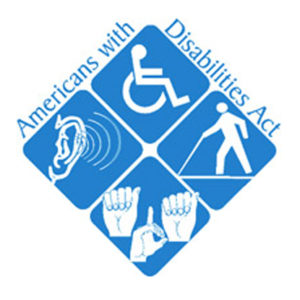 July 26 marks the anniversary of the Americans with Disabilities Act: a set of laws established to help people with disabilities gain access to society that was simply not designed for them. Since 1990, this landmark piece of legislation has improved the lives of millions of Americans by providing clarification regarding their rights to access— whether that means built-in wheelchair ramps, requesting ASL interpreters, or allowing service animals into buildings— and offering legal recourse for individuals whose rights are violated.
July 26 marks the anniversary of the Americans with Disabilities Act: a set of laws established to help people with disabilities gain access to society that was simply not designed for them. Since 1990, this landmark piece of legislation has improved the lives of millions of Americans by providing clarification regarding their rights to access— whether that means built-in wheelchair ramps, requesting ASL interpreters, or allowing service animals into buildings— and offering legal recourse for individuals whose rights are violated.
Make no mistake, the ADA has not miraculously leveled the playing field for those with disabilities. It helped lay the foundation for equal access, but the ADA does not guarantee that services will be available for those who need them when they need them.
Deaf Self Advocacy
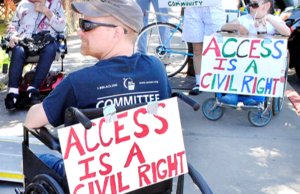 Without the hard work of determined disability rights activists, the ADA would never have been passed; and without ongoing advocacy efforts, little real change might have come from the legislation. People who do not need to reference the ADA on a regular basis to get their basic needs met are frequently unaware of their obligation to ensure equal access to their establishment / service / business. In the years since the ADA became law, people with disabilities have had to consistently perform the labor of educating people about their disabilities and what it means to be disabled in a world that favors able-bodied individuals. They must also be willing to challenge organizations to go beyond bare minimum compliance, which can sometimes mean taking on large institutions in a public way.
Without the hard work of determined disability rights activists, the ADA would never have been passed; and without ongoing advocacy efforts, little real change might have come from the legislation. People who do not need to reference the ADA on a regular basis to get their basic needs met are frequently unaware of their obligation to ensure equal access to their establishment / service / business. In the years since the ADA became law, people with disabilities have had to consistently perform the labor of educating people about their disabilities and what it means to be disabled in a world that favors able-bodied individuals. They must also be willing to challenge organizations to go beyond bare minimum compliance, which can sometimes mean taking on large institutions in a public way.
Below you will find links to some recent video blogs by individuals who are d/Deaf/HoH:
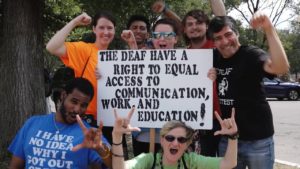
These are only a few of the thousands of thoughtful explanations and analyses of the ADA and how these legal provisions actually apply to those who are deaf. There are countless hours of video containing firsthand accounts, experiences, successes and failures available on the Internet for those wishing to gain a deeper insight into the longterm impact of the 1990 Act. Overall we have seen quite a bit of progress yet discrimination remains a fact, due in large part to simple ignorance.
If you are a deaf or hard of hearing individual, it is your responsibility to ensure that your rights are not being violated. Until we live in a world where accessibility is built-in and widely understood, the burden will continue to fall on already disadvantaged minority groups to fight for basic accommodations.
Here you will find links to some ADA resources:
 Each time a person takes it upon themselves to challenge the institution that oppresses them, they remove a barrier for the next person— no matter how big or small. This incremental progress adds up over time. If your rights are violated, pursue further action. If your needs are not adequately met, provide feedback and pursue further action. The advocacy and awareness that each person spreads works toward creating a more educated society with advanced views of disability. Pushing back is important work!
Each time a person takes it upon themselves to challenge the institution that oppresses them, they remove a barrier for the next person— no matter how big or small. This incremental progress adds up over time. If your rights are violated, pursue further action. If your needs are not adequately met, provide feedback and pursue further action. The advocacy and awareness that each person spreads works toward creating a more educated society with advanced views of disability. Pushing back is important work!
Everyone Can Support the ADA
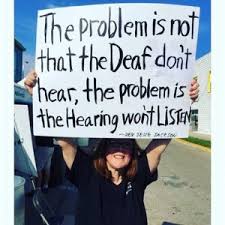 But what about allies? How can people who are not deaf or disabled help, without their position of able-bodied privilege resulting in further oppression? Where to get started?
But what about allies? How can people who are not deaf or disabled help, without their position of able-bodied privilege resulting in further oppression? Where to get started?
On a day-to-day basis, allies can look for opportunities to help raise awareness about deaf perspectives and offer support for better access. Examples:
- A marketing manager or event coordinator at a company can take it upon themselves to consistently educate about and advocate for inclusive events, emphasizing the importance of providing interpreters and advertising events as deaf-friendly.
- Managers and supervisors on a corporate level can suggest cultural competency training for employees, preferably a program created by and/ or led by people who are deaf. This will help create an understanding of diversity, and can open up new possibilities with deaf clients and customers.
- Administrators or Human Resource managers can take the time to ensure that their organization has contracts on file with high quality interpreting agencies. They can work to emphasize the importance of being prepared for deaf individuals to access goods and services as they please.
- If there are initiatives underway in the community, for example deaf individuals in your area are pushing for captioned showings at theaters, make sure to amplify their concerns and take any actions possible to support their cause.
Moving Forward
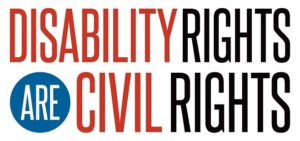 The ADA in action is more of a tool for people with disabilities than any kind of guarantee. This set of legislation only works when it is enforced, and it is up to each member of our society to help enforce it.
The ADA in action is more of a tool for people with disabilities than any kind of guarantee. This set of legislation only works when it is enforced, and it is up to each member of our society to help enforce it.
We must maintain our willingness to challenge comfortable but oppressive social norms in everyday situations. We need to keep pushing for what is right, even when it is the more difficult path. Working together, little by little we can help remove the structural roadblocks that limit individuals, thereby collectively creating a truly diverse America.
LCIS is thrilled to offer ADA Compliance Consulting for businesses and organizations. Our ADA Compliance Consulting program works in conjunction with relevant stakeholders and committee of Deaf advisors to assist organizations with reducing legal risk and ensuring that their business has all the tools for success when working with Deaf/ HoH customers, clients, or employees. Contact us Today for more information!
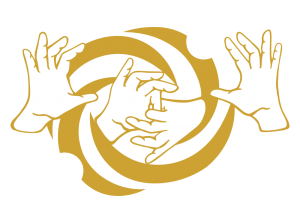





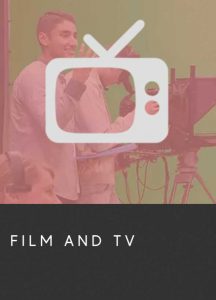





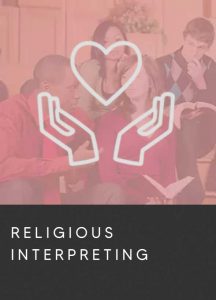
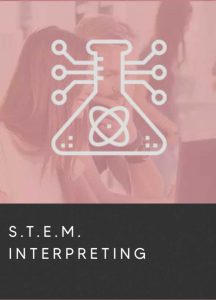
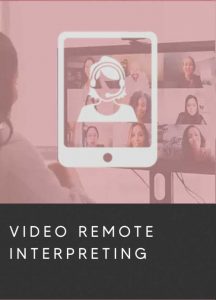
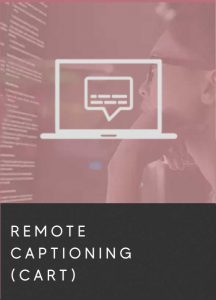

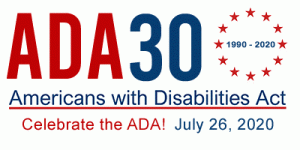
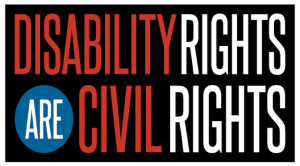 Since 1990, groups and individuals within the Disability Community have worked, advocated, litigated, protested, and lobbied to make incredible advancements toward equal access with the support of the ADA. As time goes on, we are beginning to see inclusive elements being built right into organizations and institutions – from
Since 1990, groups and individuals within the Disability Community have worked, advocated, litigated, protested, and lobbied to make incredible advancements toward equal access with the support of the ADA. As time goes on, we are beginning to see inclusive elements being built right into organizations and institutions – from  July 26 marks the anniversary of the Americans with Disabilities Act: a set of laws established to help people with disabilities gain access to society that was simply not designed for them. Since 1990, this landmark piece of legislation has improved the lives of millions of Americans by providing clarification regarding their rights to access— whether that means built-in wheelchair ramps, requesting ASL interpreters, or allowing service animals into buildings— and offering legal recourse for individuals whose rights are violated.
July 26 marks the anniversary of the Americans with Disabilities Act: a set of laws established to help people with disabilities gain access to society that was simply not designed for them. Since 1990, this landmark piece of legislation has improved the lives of millions of Americans by providing clarification regarding their rights to access— whether that means built-in wheelchair ramps, requesting ASL interpreters, or allowing service animals into buildings— and offering legal recourse for individuals whose rights are violated. Without the hard work of determined disability rights activists, the ADA would never have been passed; and without ongoing advocacy efforts, little real change might have come from the legislation. People who do not need to reference the ADA on a regular basis to get their basic needs met are frequently unaware of their obligation to ensure equal access to their establishment / service / business. In the years since the ADA became law, people with disabilities have had to consistently perform the labor of educating people about their disabilities and what it means to be disabled in a world that favors able-bodied individuals. They must also be willing to challenge organizations to go beyond bare minimum compliance, which can sometimes mean taking on large institutions in a public way.
Without the hard work of determined disability rights activists, the ADA would never have been passed; and without ongoing advocacy efforts, little real change might have come from the legislation. People who do not need to reference the ADA on a regular basis to get their basic needs met are frequently unaware of their obligation to ensure equal access to their establishment / service / business. In the years since the ADA became law, people with disabilities have had to consistently perform the labor of educating people about their disabilities and what it means to be disabled in a world that favors able-bodied individuals. They must also be willing to challenge organizations to go beyond bare minimum compliance, which can sometimes mean taking on large institutions in a public way.
 Each time a person takes it upon themselves to challenge the institution that oppresses them, they remove a barrier for the next person— no matter how big or small. This incremental progress adds up over time. If your rights are violated, pursue further action. If your needs are not adequately met, provide feedback and pursue further action. The advocacy and awareness that each person spreads works toward creating a more educated society with advanced views of disability. Pushing back is important work!
Each time a person takes it upon themselves to challenge the institution that oppresses them, they remove a barrier for the next person— no matter how big or small. This incremental progress adds up over time. If your rights are violated, pursue further action. If your needs are not adequately met, provide feedback and pursue further action. The advocacy and awareness that each person spreads works toward creating a more educated society with advanced views of disability. Pushing back is important work! But what about allies? How can people who are not deaf or disabled help, without their position of able-bodied privilege resulting in further oppression? Where to get started?
But what about allies? How can people who are not deaf or disabled help, without their position of able-bodied privilege resulting in further oppression? Where to get started? The ADA in action is more of a tool for people with disabilities than any kind of guarantee. This set of legislation only works when it is enforced, and it is up to each member of our society to help enforce it.
The ADA in action is more of a tool for people with disabilities than any kind of guarantee. This set of legislation only works when it is enforced, and it is up to each member of our society to help enforce it.




